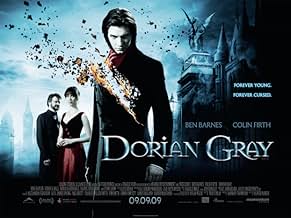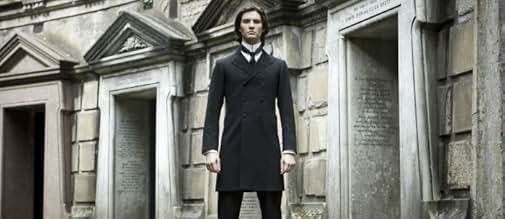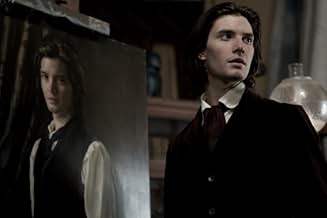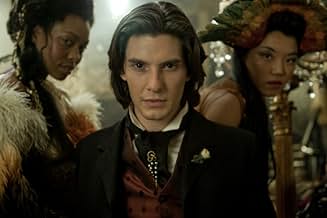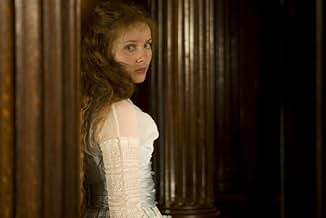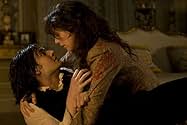IMDb-BEWERTUNG
6,2/10
70.106
IHRE BEWERTUNG
Ein korrupter junger Mann behält irgendwie seine jugendliche Schönheit für immer, aber ein besonderes Gemälde offenbart allmählich seine innere Hässlichkeit für alle.Ein korrupter junger Mann behält irgendwie seine jugendliche Schönheit für immer, aber ein besonderes Gemälde offenbart allmählich seine innere Hässlichkeit für alle.Ein korrupter junger Mann behält irgendwie seine jugendliche Schönheit für immer, aber ein besonderes Gemälde offenbart allmählich seine innere Hässlichkeit für alle.
- Auszeichnungen
- 1 Nominierung insgesamt
Jeff Lipman
- Lord Kelso
- (as Jeffrey Lipman Snr)
Empfohlene Bewertungen
The Picture of Dorian Gray, as penned by the Irish wit Oscar Wilde (1854 - 1900), is a tale of high-brow debauchery and limitless pleasures of body and soul and the corruption, by one Lord Henry Wotton, of the young, handsome and soon to be narcissistic 19th century rock 'n roll hell-raiser Dorian Gray.
Ealing Studios have translated Wilde's controversial novel into a celluloid den of iniquity that somehow comes across as rather shallow. Like the characters seen here too; it seems that as a work of symbolic gesture of how the upper classes conduct their sordid lifestyle of hypocrisy, deceit and lust it lacks any deep and thoughtful intrigue that any good 19th century Gothic horror story should be.
To fully understand the ethics of a Victorian London that Oscar Wilde has so wonderfully reflected with his novel here, we see, too, with this latest interpretation using, as Wilde may have done, the picture purely as a metaphorical means. Yes, we see the selling of souls here and the lamb to the slaughter and the hedonistic teachings of Lord Wotton, but toward the end, the whole sordid affair becomes predictable.
Penned with an undercurrent of realism and too fantasy of the love of sin. It's a dark, dirty, dingy setting of a self-indulgent Victorian London that we are lead to believe is prim and proper on the surface but lurking just below this weak, temperate society lies pure greed, greed for experience, experience that will transcend the mind, body and soul to the wondrous dealings of what life has to offer. For, as always, a price, a price both Oscar Wilde and Dorian Gray would pay the highest sacrifice.
It is with a taint of sorrow that this latest performance too has paid a price too high, sensationalism over content, ironies aside, the film seems too concerned to show the sordid details of this lifestyle and its inhabitants'. It lingers on too far in the bedrooms of London and strays too far from the mental anguish that may have been. We see the trouble mind of our young (looking) man but we see not enough of his fears, regrets, sorrows and repentance, which are cast aside and squandered. Welcome to the 21st century Mr. Wilde.
By the time the chimes of time are echoing in the distance we have Dorian fading into the far reaches of the eternal abyss of the afterlife. With all the time in the world we are still wanting more to feed our palates, it's all to aesthetically pleasing, but at the same time oh so unrewarding, a taster we are given but the full flavour we are, regrettably, spared.
This too may have its target audience and in so having picked its target out it may have trouble standing the test of time, due to its lack of wit, lack of diversity and a lack of daring and commitment of its original source. It is a sad loss that such a literary work of historical meaning and wealth should have been robbed of its qualities.
Ealing Studios have translated Wilde's controversial novel into a celluloid den of iniquity that somehow comes across as rather shallow. Like the characters seen here too; it seems that as a work of symbolic gesture of how the upper classes conduct their sordid lifestyle of hypocrisy, deceit and lust it lacks any deep and thoughtful intrigue that any good 19th century Gothic horror story should be.
To fully understand the ethics of a Victorian London that Oscar Wilde has so wonderfully reflected with his novel here, we see, too, with this latest interpretation using, as Wilde may have done, the picture purely as a metaphorical means. Yes, we see the selling of souls here and the lamb to the slaughter and the hedonistic teachings of Lord Wotton, but toward the end, the whole sordid affair becomes predictable.
Penned with an undercurrent of realism and too fantasy of the love of sin. It's a dark, dirty, dingy setting of a self-indulgent Victorian London that we are lead to believe is prim and proper on the surface but lurking just below this weak, temperate society lies pure greed, greed for experience, experience that will transcend the mind, body and soul to the wondrous dealings of what life has to offer. For, as always, a price, a price both Oscar Wilde and Dorian Gray would pay the highest sacrifice.
It is with a taint of sorrow that this latest performance too has paid a price too high, sensationalism over content, ironies aside, the film seems too concerned to show the sordid details of this lifestyle and its inhabitants'. It lingers on too far in the bedrooms of London and strays too far from the mental anguish that may have been. We see the trouble mind of our young (looking) man but we see not enough of his fears, regrets, sorrows and repentance, which are cast aside and squandered. Welcome to the 21st century Mr. Wilde.
By the time the chimes of time are echoing in the distance we have Dorian fading into the far reaches of the eternal abyss of the afterlife. With all the time in the world we are still wanting more to feed our palates, it's all to aesthetically pleasing, but at the same time oh so unrewarding, a taster we are given but the full flavour we are, regrettably, spared.
This too may have its target audience and in so having picked its target out it may have trouble standing the test of time, due to its lack of wit, lack of diversity and a lack of daring and commitment of its original source. It is a sad loss that such a literary work of historical meaning and wealth should have been robbed of its qualities.
When I first heard about the Picture of Dorian Gray becoming a movie I was excited and overjoyed. I thought with this new technology the 21st century has, The Picture of Dorian Gray will receive the justice it deserves. However, I was very wrong. I just finished watching the movie and I felt compelled to write a review about it.The movie was horrible. A grand disappointment which had such potential to be great. Firstly, the movie should have claimed to be inspired by the novel not based on it. I say this because the movie was very different from the novel. All of Oscar Wilde's wit and beauty which truly made the novel classic was ruined and overshadowed by the changes the movie made. I understand that there can be biased when reading a novel before seeing the movie adaption, but this movie adaption was appalling. I wont give anything away but the movie seriously ruined Oscar Wilde's vision and above all his memorable characters. Once the movie changed aspects in the novel the whole thing became horrible. Trust me, you'll agree if you've read the novel first.
Ben Barnes is simply gorgeous but he hardly brought any character development. I never felt pity for him throughout the movie compared to the novel. The novel brought the characters to life and described the reality of London life. The movie made the classic novel very shallow. I must add that as much as I love Colin Firth he was not convincing as Lord Henry. The character was someone who was vindictive and unchanging. He drained Dorian and was never affected by the consequences of his own evil; Colin Firth failed at reincarnating the abhorred character. Whats worse is that the whole ending is changed, which ruins the whole message of the novel. In the end, Oscar Wilde's masterpiece remains legendary in its pages as opposed to its film adaption. Seriously, I think my rate of 4 is being to generous.
Ben Barnes is simply gorgeous but he hardly brought any character development. I never felt pity for him throughout the movie compared to the novel. The novel brought the characters to life and described the reality of London life. The movie made the classic novel very shallow. I must add that as much as I love Colin Firth he was not convincing as Lord Henry. The character was someone who was vindictive and unchanging. He drained Dorian and was never affected by the consequences of his own evil; Colin Firth failed at reincarnating the abhorred character. Whats worse is that the whole ending is changed, which ruins the whole message of the novel. In the end, Oscar Wilde's masterpiece remains legendary in its pages as opposed to its film adaption. Seriously, I think my rate of 4 is being to generous.
I've been puzzled by the negative reviews i've seen for this as i really enjoyed it. It looks superb, with some excellent atmospheric Victorian locations. Ben Barnes is perfect as Dorian, good looking but not bland & still sympathetic throughout the film. The character of Emily which has been invented for the film works very well, and Colin Firth is magnificent in his pivotal role. Dorians gradual deprivation is well shown without heading off into exploitation and he is given real depth. His tragedy is very obvious.I must admit to not having read the original book as yet, but I do intend to now. I really enjoyed it but for its full benefit I recommend seeing it at the cinema.
I liked the 1945 film very much, but have always looked forward to a newer film that could dare to delve into the excesses that Wilde could only hint at in his novel, and even the 1945 film had to change a minor few details to make it acceptable for that time.
Now, this version - while it does show more, it has far less. There is none of the wit and wisdom of the characters in the novel or the delicate beauty of Dorian, and the ending is completely changed for no good reason.
I still have to wait for the definitive film version that can (literally) flesh out the characters while still keeping the novel intact. Too much to ask?
Now, this version - while it does show more, it has far less. There is none of the wit and wisdom of the characters in the novel or the delicate beauty of Dorian, and the ending is completely changed for no good reason.
I still have to wait for the definitive film version that can (literally) flesh out the characters while still keeping the novel intact. Too much to ask?
It is obvious, the novel is only a pretext for a kind puzzle game with crumbs from Portrait of Dorian Gray. Maybe not so bad if you ignore the book. But if not, the only compensation can be the effort of Colin Firth and Ben Chaplin.
Ben Barnes ? Hansome, off course but, unfortunatelly, not Dorian. The exercises of exploration of Dorian gray past are only good intentioned.
In short, not a bad film but sort of childish exploration of a lot of ifs only for surprise or impress or seduce or be, apparently, cool.
But, not exactly Oscar Wild and, for me, it is not happy option.
Sure, new century, new states. But Portrait of Dorian Gray is more than thriller/ horror/ Gothic. Or , exactly the deep subtance, in this adaptation, just missing.
Ben Barnes ? Hansome, off course but, unfortunatelly, not Dorian. The exercises of exploration of Dorian gray past are only good intentioned.
In short, not a bad film but sort of childish exploration of a lot of ifs only for surprise or impress or seduce or be, apparently, cool.
But, not exactly Oscar Wild and, for me, it is not happy option.
Sure, new century, new states. But Portrait of Dorian Gray is more than thriller/ horror/ Gothic. Or , exactly the deep subtance, in this adaptation, just missing.
Wusstest du schon
- WissenswertesThe original Dorian Gray has blond curly hair and blue eyes.
- PatzerWhen Dorian is fighting Jim in the train station tunnel, the sleepers and spikes are visible. The spikes seen were not in use in 1890 when the novel was written, nor the era when the film is set.
- Zitate
Lord Henry Wotton: There's no shame in pleasure. Man just wants to be happy. But society wants him to be good. And when he's good, he's rarely happy. But when he's happy, he's always good.
- Crazy CreditsAt the start of the closing credits, they fade in and out, alternating with images of the Portrait peeking through, as though it is trying to assert itself.
- Alternative VersionenDuring post-production, the film was tailored for a '15' certificate in the UK. According to the BBFC, the filmmaker cuts were as follows:
- A scene in which a tea party is inter-cut with shots showing Dorian's sadomasochistic excesses was toned down to remove or reduce the more explicit moments (explicit sight of a fingernail being pulled off, explicit sight of a chest being cut with a razor in a sexual context, explicit sight of blood being sucked from a woman's breasts and sight of a restrained man being beaten).
- Additionally, a murder scene was toned down to remove the sense of dwelling on the infliction of pain and injury (reduction in the number of stabbings, removal of a blood spurt from man's neck, reduction in sight of victim choking on his blood).
- VerbindungenFeatured in Lost in Adaptation: The Picture of Dorian Gray 2009 (2020)
Top-Auswahl
Melde dich zum Bewerten an und greife auf die Watchlist für personalisierte Empfehlungen zu.
Details
- Erscheinungsdatum
- Herkunftsland
- Offizieller Standort
- Sprache
- Auch bekannt als
- El retrato de Dorian Gray
- Drehorte
- Produktionsfirmen
- Weitere beteiligte Unternehmen bei IMDbPro anzeigen
Box Office
- Weltweiter Bruttoertrag
- 22.873.653 $
- Laufzeit
- 1 Std. 52 Min.(112 min)
- Farbe
- Sound-Mix
- Seitenverhältnis
- 1.85 : 1
Zu dieser Seite beitragen
Bearbeitung vorschlagen oder fehlenden Inhalt hinzufügen




